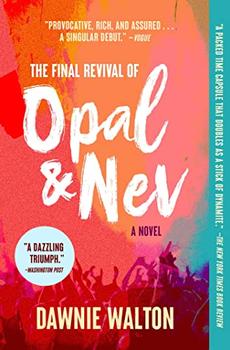Summary | Excerpt | Reading Guide | Reviews | Beyond the book | Read-Alikes | Genres & Themes | Author Bio

David Mitchell's Utopia Avenue follows the path of an eclectic rock group — the eponymous Utopia Avenue — as it forms in London in 1967, rises in popularity and eventually hits the big time. Its members are brought together by Levon Frankland, a producer for Moonwhale Music, who decides to construct the perfect musical group. He recruits four remarkable misfits in his quest: Dean Moss, bass; Elizabeth "Elf" Holloway, keyboards; electric guitar genius Jasper de Zoet; and drummer Peter "Griff" Griffin. In addition to being brilliant instrumentalists, each is a fantastic singer and three out of the four are talented composers to boot. The strangers agree to give the arrangement a go, and after a few rocky starts grow into the hit-factory envisioned by their manager. More importantly, though, as they travel together and experience the ups and downs of the London rock scene, the loners become a family.
Utopia Avenue defies easy categorization. Its time period seems a little too recent to label it "historical fiction," but it has all the hallmarks of a truly outstanding historical fiction novel nonetheless. The 1960s, of course, was a period of enormous societal change; Vietnam War protests were occurring, women and Black people were visibly asserting their rights, people were experimenting with mind-altering substances, taboos against sex were falling while skirts were rising – and the popular music of the day reflected these changes. Mitchell could have taken his tale in a number of directions to make a statement about the era, but chooses to avoid commentary; the book is more of a snapshot of a specific time. He does, however, capture the complexity of the age through his pitch-perfect depiction of London's pop-music scene. Everything you'd expect to encounter in a book about the 1960s is present – the drugs, parties, sex, anti-war riots, elevation of rock stars to near godlike status – and yet it's so skillfully portrayed that the setting feels entirely fresh, if not revelatory. The author's passion for his subject is evident on each page, and his knowledge of it is remarkable; I admit I was shocked to learn he was born after the events depicted in the book and hadn't actually lived through the turbulent '60s because everything about his narrative feels so spot-on.
The core of the novel is the characters as they grow and change, each learning about who they are and what they want out of life. They travel together, but the primary journey is one of individual self-discovery. Each chapter is told from the point of view of one of the songwriters (Levon and Griff each get one pivotal chapter, but the lion's share of the narrative bounces between the other three), and through their perspectives readers get to know each of the bandmates intimately, complete with all their quirks and foibles. This works well with the book's structure; each chapter's title is the name of one of the group's songs, and the point of view reflected within it is that of the particular song's composer, with some revelation about how the song came to be. I can honestly say I can't remember another book where I so completely fell in love with the characters, even though each is flawed (some more than others) and at times behaves unwisely. I was truly saddened on reaching the novel's conclusion, knowing that I'd never again encounter these new friends.
Those familiar with Mitchell's oeuvre will know that, like Stephen King and Neal Stephenson, he generally connects his novels back to each other in some way, and Utopia Avenue is no exception. I found that this particular book was more straightforward than some of his earlier works, however, and those encountering Mitchell for the first time won't feel like they're missing important information for the most part. There's one key plot point about two-thirds of the way through that does briefly veer solidly into Mitchell's multiverse. If you're unfamiliar with his works, what exactly is happening here could be confusing, but the end result is clear enough that you won't feel overly lost. That said, there are plenty of "Easter eggs" scattered throughout the narrative that will delight the author's seasoned fans. For example, Jasper shares a surname with the protagonist of Mitchell's earlier novel The Thousand Autumns of Jacob de Zoet.
My only quibble is with the "cameos" the author packs into the novel. As the band gets invited to parties and the crew goes on tour, they encounter a musical who's who (David Bowie, Janis Joplin, John Lennon, Jerry Garcia… and many, many others). This mostly works, as it's reasonable to think the up-and-coming musicians could run into these seasoned performers, but there's just so much of it that it gets a little old after a while. This is a pretty trivial complaint, though; the book is otherwise stellar.
Utopia Avenue is Mitchell's first novel in five years, and it was definitely worth the wait. I found it fascinating from start to finish. I thoroughly enjoyed this musical trip back in time and highly recommend it to anyone interested in the era or in pop music culture, as well as those who already number among the author's fans. Readers simply searching for a superb work of fiction should also put this one on their lists.
![]() This review was originally published in The BookBrowse Review in July 2020, and has been updated for the
May 2021 edition.
Click here to go to this issue.
This review was originally published in The BookBrowse Review in July 2020, and has been updated for the
May 2021 edition.
Click here to go to this issue.

If you liked Utopia Avenue, try these:

The Final Revival of Opal & Nev
by Dawnie Walton
Published 2022
A kaleidoscopic fictional oral history of the beloved rock 'n' roll duo who shot to fame in 1970s New York, and the dark, fraught secret that lies at the peak of their stardom.

by Taylor Jenkins Reid
Published 2020
A New York Times bestseller. A gripping novel about the whirlwind rise of an iconic 1970s rock group and their beautiful lead singer, revealing the mystery behind their infamous breakup.
Your guide toexceptional books
BookBrowse seeks out and recommends the best in contemporary fiction and nonfiction—books that not only engage and entertain but also deepen our understanding of ourselves and the world around us.